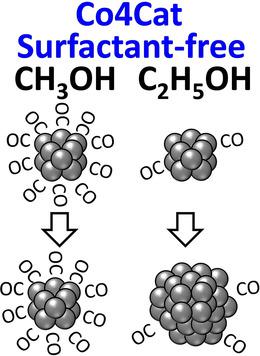当前位置:
X-MOL 学术
›
Chem. Eur. J.
›
论文详情
Our official English website, www.x-mol.net, welcomes your
feedback! (Note: you will need to create a separate account there.)
Solvent-Dependent Growth and Stabilization Mechanisms of Surfactant-Free Colloidal Pt Nanoparticles.
Chemistry - A European Journal ( IF 3.9 ) Pub Date : 2020-05-19 , DOI: 10.1002/chem.202001553 Jonathan Quinson 1 , Sarah Neumann 2 , Laura Kacenauskaite 1 , Jan Bucher 3 , Jacob J K Kirkensgaard 4 , Søren B Simonsen 5 , Luise Theil Kuhn 5 , Alessandro Zana 3 , Tom Vosch 1 , Mehtap Oezaslan 6, 7 , Sebastian Kunz 2, 8 , Matthias Arenz 3
Chemistry - A European Journal ( IF 3.9 ) Pub Date : 2020-05-19 , DOI: 10.1002/chem.202001553 Jonathan Quinson 1 , Sarah Neumann 2 , Laura Kacenauskaite 1 , Jan Bucher 3 , Jacob J K Kirkensgaard 4 , Søren B Simonsen 5 , Luise Theil Kuhn 5 , Alessandro Zana 3 , Tom Vosch 1 , Mehtap Oezaslan 6, 7 , Sebastian Kunz 2, 8 , Matthias Arenz 3
Affiliation

|
Understanding the formation of nanoparticles (NPs) is key to develop materials by sustainable routes. The Co4CatTM process is a new synthesis of precious metal NPs in alkaline mono‐alcohols well‐suited to develop active nanocatalysts. The synthesis is ‘facile’, surfactant‐free and performed under mild conditions like low temperature. The reducing properties of the solvent are here shown to strongly influence the formation of Pt NPs. Based on the in situ formation of CO adsorbed on the NP surface by solvent oxidation, a model is proposed that accounts for the different growth and stabilization mechanisms as well as re‐dispersion properties of the surfactant‐free NPs in different solvents. Using in situ and ex situ characterizations, it is established that in methanol, a slow nucleation with a limited NP growth is achieved. In ethanol, a fast nucleation followed by continuous and pronounced particle sintering occurs.
中文翻译:

无表面活性剂的胶体Pt纳米颗粒的溶剂依赖性生长和稳定机理。
了解纳米颗粒(NPs)的形成是通过可持续途径开发材料的关键。Co4Cat TM该工艺是在碱性单醇中合成贵金属NP的新方法,非常适合开发活性纳米催化剂。合成过程“简便”,不含表面活性剂,并且可在低温等温和条件下进行。此处显示的溶剂的还原性能强烈影响Pt NP的形成。基于通过溶剂氧化在NP表面吸附的CO的原位形成,提出了一个模型,该模型考虑了不同的生长和稳定机制以及不含表面活性剂的NP在不同溶剂中的再分散特性。使用原位和异位表征,可以确定在甲醇中,实现了缓慢的成核,且NP的生长受到限制。在乙醇中,发生快速成核,然后进行连续且明显的颗粒烧结。
更新日期:2020-07-20
中文翻译:

无表面活性剂的胶体Pt纳米颗粒的溶剂依赖性生长和稳定机理。
了解纳米颗粒(NPs)的形成是通过可持续途径开发材料的关键。Co4Cat TM该工艺是在碱性单醇中合成贵金属NP的新方法,非常适合开发活性纳米催化剂。合成过程“简便”,不含表面活性剂,并且可在低温等温和条件下进行。此处显示的溶剂的还原性能强烈影响Pt NP的形成。基于通过溶剂氧化在NP表面吸附的CO的原位形成,提出了一个模型,该模型考虑了不同的生长和稳定机制以及不含表面活性剂的NP在不同溶剂中的再分散特性。使用原位和异位表征,可以确定在甲醇中,实现了缓慢的成核,且NP的生长受到限制。在乙醇中,发生快速成核,然后进行连续且明显的颗粒烧结。









































 京公网安备 11010802027423号
京公网安备 11010802027423号